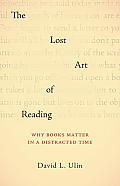
So why is reading important? For me, there are many layers to that question, some going back to childhood when I read as both escape and immersion, and some having to do with adulthood, when I read... for escape and immersion, again. Or maybe that's glib, an attempt to categorize the uncategorizable. Let's just say it plain: I read because I love it, and because it enlarges me. That was the impetus for
The Lost Art of Reading, which started out as an
essay last summer in the
Los Angeles Times. I had noticed, in this culture of constant distraction, that I was having trouble pulling back from the present, trouble disconnecting myself from all the noise and humming, trouble quieting down to read.
This could be a personal affliction; in fact, it's certainly a personal affliction, whatever else it is. I can only see the world from my own perspective, can only report back on the experience I have. Still, based on the emails I received in the wake of that essay, I began to think I might not be alone. In 13 Ways of Looking at the Novel, Jane Smiley suggests that one reason to read long fiction is that it instills in us a sense of empathy. We are required, by the nature of the form, to enter into another's personality, another's attitudes, another's way of engaging with the world. Smiley's right, of course — and if we can agree on that, then we can also agree that reading is (or can be) a corrective for a public culture that thrives on antipathy, on conflict, on angry shouting rather than informed debate. Reading, in other words, is important because it helps diffuse that sense of being right all the time by drawing us into another's point-of-view.
This quality of standing against prevailing sensibilities is why despots have always found reading dangerous; it can fill our heads with subversive ideas. To think otherwise is to reduce the power of literature to a chimera, to suggest that art is tame and inconsequential, that the autocrats really do have nothing to fear. Such a belief has become common in the industrialized west, where dissent has long been a kind of shadow play, but its converse may be the only thing the totalitarians ever got right. Just look at Vaclav Havel, Isaac Babel, Aleksandr Solzhenitsyn; look at Voltaire and Thomas Paine — all of them vindicated (celebrated, even) by history, not just for the acuity but for the influence of their words.
And yet, if that were the only reason to read, we'd be a poor reading culture, for reading doesn't have to have a point. It can be isolating, antisocial even, as Alan Bennett suggests in his short novel The Uncommon Reader; it can take us away from the world. This, too, is what it has to offer, a way to pull back from the tumult and to withdraw, if only for a moment, into ourselves.
Once again, escape and immersion... after all this time, in the most fundamental sense, still the essence of why I read.